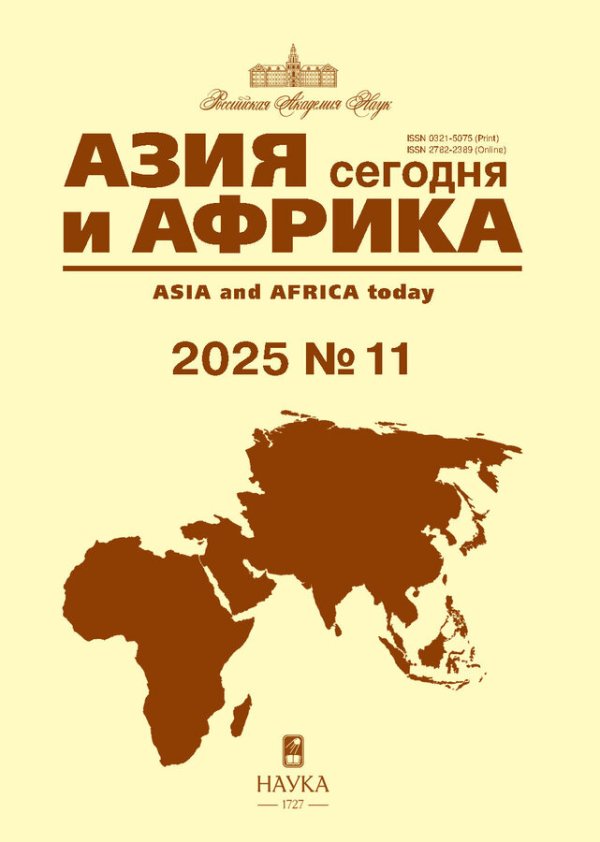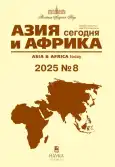Women in Mauritius: Social Status and Political Activity
- Authors: Denisova T.S1, Kostelyanets S.V1
-
Affiliations:
- Institute for African Studies, Russian Academy of Sciences
- Issue: No 8 (2025)
- Pages: 22-30
- Section: Politics, economics
- URL: https://rjsvd.com/0321-5075/article/view/690663
- DOI: https://doi.org/10.31857/S0321507525080032
- ID: 690663
Cite item
Abstract
The issues surrounding the achievement of gender equality in African countries remain an integral part of debates concerning democratization and sustainable development. Enhancing women’s political, economic, and social empowerment is commonly linked to increasing their representation in legislative and executive bodies. Through such participation, women gain the ability to influence decision-making processes, including those pertaining to gender relations. Analysis of the social position and political role of Mauritian women has revealed that the elevation of their public status and the expansion of their political participation occur primarily within the context of government-driven gender-sensitive policies, rather than as a direct result of the actions of female parliamentarians. Numerous women’s associations, established as early as the colonial period, exert a certain influence on the Mauritian government’s adoption of legislation aimed at improving women’s status. However, the effectiveness of these associations is undermined by intra-movement divisions along racial, religious, and other lines, as well as by their dependence on government funding and the consequent governmental control over their activities.
Keywords
About the authors
T. S Denisova
Institute for African Studies, Russian Academy of Sciences
Email: tsden@hotmail.com
PhD (History), Leading Researcher, Head, Centre for the Study of Africa South of Sahara Moscow, Russia
S. V Kostelyanets
Institute for African Studies, Russian Academy of Sciences
Email: sergey.kostelyanyets@gmail.com
PhD (Political Science), Leading Researcher, Head, Centre for Sociological and Political Sci- ences Studies Moscow, Russia
References
- Grey S. 2006. Numbers and Beyond: The Relevance of Critical Mass in Gender Research. Politics & Gender. Vol. 2. № 4. Pp. 492–502.
- Denisova T.S., Kostelyanets S.V. Rwanda as Africa’s Rising Center of Power? Three Decades of Post-Genocide Development. Asia and Africa today. 2024. № 9. Pp. 12–20. (In Russ.). doi: 10.31857/S032150752409002-2
- Ballington J. 2004. The Implementation of Quotas: African Experiences. Stockholm: International Institute for Democracy and Electoral Assistance.
- Dabee A. 2018. Rethinking Women’s Political Agency in Mauritius: An Intersectional Feminist Perspective. Doctoral Thesis. Adelaide: Flinders University.
- Gender-Based Violence in Africa: Origins, Motives, Types. Moscow, 2024. (In Russ.)
- The Gender Aspect of African Culture: Between Archaism and Modernity. Moscow, 2022. (In Russ.)
- Ksenofontova N.A., Grishina N.V. 2018. Initiations as a Factor and the Way of Social and Gender Identity. Journal of the Institute for African Studies. № 3. Pp. 63–90. (In Russ.)
- Miles W.F.S. 2000. The Politics of Language Equilibrium in a Multilingual Society: Mauritius. Comparative Politics. Vol. 32. № 2. Pp. 215–230.
- Ramtohul R. 2015. Globalization, Intersectionality and Women’s Activism: An Analysis of the Women’s Movement in the Indian Ocean Island of Mauritius. Moka: University of Mauritius.
- Subramanian A. 2009. The Mauritian Success Story and Its Lessons. Leibniz Information Centre for Economics, WIDER Research Paper, № 2009/36. Helsinki: The United Nations University World Institute for Development Economics Research. https://www.econstor.eu/bitstream/10419/45119/1/601805518.pdf (accessed 02.03.2025)
- Amri L., Ramtohul R. (ed.). 2014. Gender and Citizenship in the Global Age. Dakar: CODESRIA.
- Ahmed S.M. 2019. Double Colonization: A Postcolonial Feminist Study of Sia Figiel’s Where We Once Belonged. Scholaria Jurnal Pendidikan dan Kebudayaan. Vol. 9. № 1. Pp. 1–10.
- Unda V.P. 2005. Review of Why Women Protest: Women’s Movements in Chile, by L. Baldez. Rocky Mountain Review of Language and Literature. Vol. 59. № 2. Pp. 112–114. doi: 10.2307/3655060
Supplementary files











